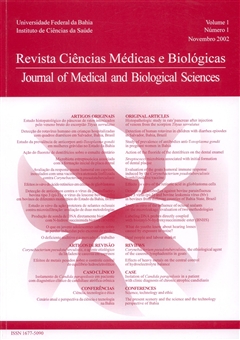Effects of heavy metals on the central control of hydroelectrolyte balance
DOI:
https://doi.org/10.9771/cmbio.v1i1.4249Keywords:
Lead, cadmium, zinc, water intake, salt intakeAbstract
The present paper reviews data previously obtained by the Neuroscience Laboratory, Health Sciences Institute, Federal University of Bahia concerning the acute effects of heavy metals on the central regulation of hidrosaline balance in the rat. Briefly, the data from the group have demonstrated that central administration of lead and cadmium induces a significant inhibition in water intake, both when thirst results from a physiological drive (dehydration) or from a pharmacological treatment (central angiotensinergic and cholinergic stimulation). Furthermore, the works of the group have indicated that acute lead and cadmium injections elicit a significant natriuretic response. In addition, it was demonstrated that acute lead injections to the central nervous system reduce salt appetite. The possible mechanisms explaining the effects observed by the group and the probable implication on other biological fields are commented here.Downloads
Download data is not yet available.
Downloads
Published
2002-07-13
How to Cite
Silva, E. de C. e, & Fregoneze, J. (2002). Effects of heavy metals on the central control of hydroelectrolyte balance. Journal of Medical and Biological Sciences, 1(1), 116–123. https://doi.org/10.9771/cmbio.v1i1.4249
Issue
Section
Review Articles
License
The Journal of Medical and Biological Sciences reserves all copyrights of published works, including translations, allowing, however, their subsequent reproduction as transcription, with proper citation of source, through the Creative Commons license. The periodical has free and free access.


